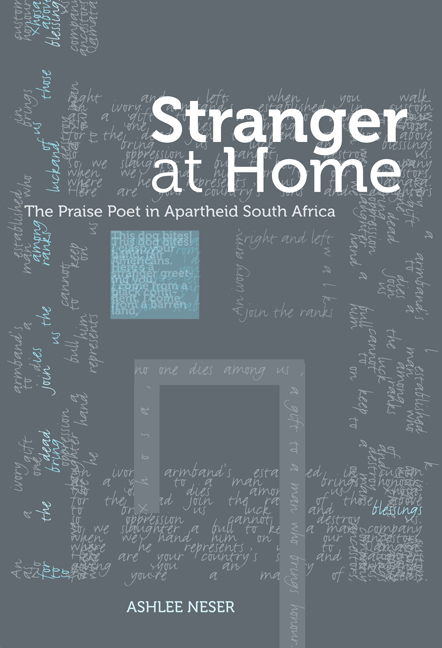five - Provocative audiences of the academy
from part two
Published online by Cambridge University Press: 17 May 2019
Summary
Praise poets intervene in public life under the authority of the conventions attached to their art. It is convention that authorises the rural imbongi to mediate between an established ruler and his public, and to name each party to the social contract in ways that assert their mutual duty. Under the same conventions that govern the rural imbongi's role as mediator and official name-giver, industrial praise poets of the 1980s personified trade unions as duty-bound representatives of their worker-publics. Although the established literary tradition of izibongo is identified primarily with the chiefdom, trade union praise poetry illustrates the form's capacity for powerful address and efficacy in the secular politics of urban environments.
Literary conventions operate as a web of mutually supporting and limiting agreements: if it is widely agreed according to one convention that the imbongi is licensed to speak uncomfortable truths, another convention empowers the audience to decide at each performance the extent to which the poet will be heard. This web of interlocking convention is pinned to the socio-political landscape. In Chapter 3, I argued that the political milieu can nullify conventions that remain supportable from the perspective of the performer and his audience: the introduction of punitive security legislation in Transkei, for instance, effectively silenced many iimbongi even though their publics continued to support literary intervention in the political arena. At Transkei's ‘independence’ celebrations, David Manisi's struggle with his disempowering political context and with his own conflicting political loyalties prevented him from laying full claim to the truth-telling and critical conventions of his literary form, even though he must have felt that his public would ratify a scathing attack on Mathanzima's relationship with Pretoria.
In his performances for university audiences, Manisi was perhaps freer than at any other time in his recorded career to pursue the licences and mandates of his form, and yet, ironically, the conventions that empowered him were alien to most of his uninitiated, English-speaking audiences and therefore ineffective. Expecting demonstrations of a ‘native’ form, most of Manisi's academic auditors had little sense during the poet's performances that they were being addressed as political agents in terms mandated by a powerful genre.
- Type
- Chapter
- Information
- Stranger at HomeThe Praise Poet in Apartheid South Africa, pp. 170 - 204Publisher: Wits University PressPrint publication year: 2011



